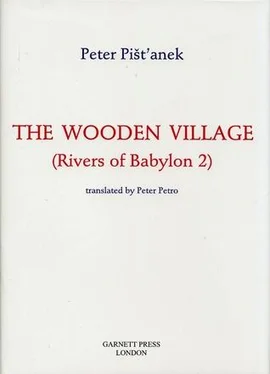Peter Pišťanek - The Wooden Village
Здесь есть возможность читать онлайн «Peter Pišťanek - The Wooden Village» весь текст электронной книги совершенно бесплатно (целиком полную версию без сокращений). В некоторых случаях можно слушать аудио, скачать через торрент в формате fb2 и присутствует краткое содержание. Год выпуска: 2008, Издательство: Garnett Press, Жанр: Современная проза, на английском языке. Описание произведения, (предисловие) а так же отзывы посетителей доступны на портале библиотеки ЛибКат.
- Название:The Wooden Village
- Автор:
- Издательство:Garnett Press
- Жанр:
- Год:2008
- ISBN:нет данных
- Рейтинг книги:3 / 5. Голосов: 1
-
Избранное:Добавить в избранное
- Отзывы:
-
Ваша оценка:
- 60
- 1
- 2
- 3
- 4
- 5
The Wooden Village: краткое содержание, описание и аннотация
Предлагаем к чтению аннотацию, описание, краткое содержание или предисловие (зависит от того, что написал сам автор книги «The Wooden Village»). Если вы не нашли необходимую информацию о книге — напишите в комментариях, мы постараемся отыскать её.
The Wooden Village — читать онлайн бесплатно полную книгу (весь текст) целиком
Ниже представлен текст книги, разбитый по страницам. Система сохранения места последней прочитанной страницы, позволяет с удобством читать онлайн бесплатно книгу «The Wooden Village», без необходимости каждый раз заново искать на чём Вы остановились. Поставьте закладку, и сможете в любой момент перейти на страницу, на которой закончили чтение.
Интервал:
Закладка:
* * *
Apart from the beer-drinking regulars, namely the local stokers and the ill-smelling and eternally drunken Majerník’s wild parasitic gang, the Wooden Village has quite a variety of other customers.
Among the frequent guests are three long-haired bearded poets. They always sit with their beer, looking tragic. Sometimes they show up in the company of one or two elderly and ugly bitches who pay for their drinks. Sometimes, especially when they’ve had too much to drink, they recite their poems in hysterical, unpleasantly high-pitched voices and try to trump each other as if they were playing cards. Other, less artistically oriented beer drinkers gawp at them with their mouths hanging open, switching their gaze from one poet to another one, according to whoever is reciting at the moment. One of the customers reacts: “Stop fucking around, boys, you’re Slovaks, aren’t you! Have a drink instead, for God’s sake!”
But when the poets get too noisy, proud Feri or Four-Eyes, depending who happens to be on duty, brings a bucket of water and splashes it over them. The wet poets fall silent. They’re cowardly and afraid of being hit. They’re scared of Four-Eyes, who’s like a bean-pole, and even of the slightly built Bartaloš. But they don’t want to leave, they’re not that proud. Wet, with wet rucksacks on their backs, they humbly keep silent and look into their beer glasses. But their heads generate colourful poems filled with opposition and resistance, courage and combat.
The poets disappear in summer. They leave for Germany or France where they hire themselves out as slave labour. They clean lavatories, hose down slaughterhouses, collect rubbish and sweep streets: whatever they can get. When they return, they turn their backs on the Wooden Village and its ignorant and uncouth customers. They prefer to lounge about in the snobbish Writers’ Club. Now, young slender girls with big eyes accompany them. The poets down one Scotch after another and with condescending voices shout clever lines about the dirt, stink, and repulsiveness of this world. The girls ogle them and the Club’s stylish furniture. They want to be part of the big world. All around them sit old writers, whose angular bony behinds are sunk in the plush furniture, tremulously sipping delicious cheap soup. The long-hairs make a mental note of their profound utterances and later, at home, make poems out of them. The poems meet a generally positive response. The critics have even found a label for them: they call them the Bastard Generation. If the bastards, when they travelled abroad, worked in pastry shops, their poems would be filled with whipping cream, chocolate and vanilla. But we have to take them as they are.
But the money from abroad is soon gone. The head waiter in the Writers’ Club will put the bottle of whisky back on the shelf. The hairy bearded poets sit there drying out and occasionally cadge a beer or a cigarette off someone. When they drank whisky, they were too proud to know anyone; they only talked to each other and their pretty companions. The pretty companions have vanished somewhere, and the poets recall their ugly older bitches. If their stupid and naïve colleagues won’t buy them drinks, the old cows will. If they won’t help them of their own free will, they’ll do it without knowing. The bastard poets will somehow get hold of a gold ring, a brooch, or a necklace.
After the second-hand dealer, the poets’ next stop is the Wooden Village. They’ll order Bratislava crap beer, sit round a wooden table and take refuge in meaningful silence. They are set up for one more year.
* * *
No, Freddy Piggybank didn’t fall in love with Sida Tešadíková, the leader of the Daughters of Death. He loved only himself, and even coming events would change nothing. However, memories of the strange intense pleasure he experienced when tortured by the furious Amazons were retained somewhere in the middle of his skull, and in his mind he began to plan how to relive this experience.
Nothing could have been easier. The legend of the Strangler had fallen into oblivion, but Freddy found a way of recharging his gang: a new campaign. For several Saturdays they combed the hills from the Sandhill to the Limestone Pit and from Glavica to Mare Mountain, until they finally discovered the carefully camouflaged entrance to the new camp of the Daughters of Death.
“Burn it down!” ordered Freddy Piggybank, nonchalantly leaning on his stick like Rescator, a character from the film about Angélique. “Burn the lot!” he repeated, and a thin fibre of spittle ran from his mouth.
He silently watched the dugout’s burning roof and the burning totem pole. He knew that the smoke over the Limestone Pit would bring out the Daughters of Death, and they would come running like furies. That was why he kept delaying the departure of his gang of arsonists. His younger friends saw what the fire had done and took fright.
“All right, leave!” Freddy commanded them. “I’ll stay for a while,” he added. “I want to make sure that everything has burnt down!”
He sat down on a rock and paid no more attention to his underlings. The thought of being tied up again made him go red in the face.
The girl avengers didn’t show up. The Daughters of Death were probably all doing their homework. Their camp burnt down completely and none of them noticed. When the camp was reduced to ashes, Piggybank got up, and slowly, reluctantly walked home, occasionally looking over his shoulder.
He didn’t escape vengeance, though. The Daughters of Death ambushed him in a neglected and abandoned little park near Nová Ves train station, as he took a short cut home, which he always did on Friday when he took the train from Hodonín for the weekend.
A silent group of adolescent tom-boys in heavy military boots surrounded him, jumped him and began to tear his clothes off. Nobody gagged him, but, in any case, Freddy uttered only quiet moans of complicity. Everything happened as if by unspoken mutual agreement. When Freddy stood as naked as a worm, the girls took some rope and bundled him up, so that his wrists were tightly bound to his knees. They stuffed his clothes into his sports bag, which was the first thing they had grabbed. Later they threw it into the fish-pond.
Freddy lay on the damp earth, which constant shade and wild vegetation had turned acid, and again felt the excitement he had enjoyed before. He lay naked, bound, and defenceless as his furious tormentors watched. His tiny little penis, typical of most obese males, started to swell with passion and soon hung between his thighs like a stallion’s. The Daughters of Death didn’t miss this transformation. Sida Tešadíková laughed diabolically and spat on it.
There are two kinds of stinging nettle. One grows on sunny slopes and its potential for causing pain is largely imaginary. Quite different is the fleshy stinging nettle that grows in humid shady copses. A blow with a bundle of this kind of nettle is like a burn from a red-hot iron. Those were the nettles that grew in what used to be the little park beneath the railway station.
The Daughters of Death put on heavy leather gauntlets and grabbed the nettles they had already gathered. They threw themselves with yells at Freddy, and soon his screeches drowned their shouts. His member was as erect as a small, but thick telegraph pole. Soon a white fluid spilled from it and Freddy closed his eyes under the strain of a penetrating torment and pleasure that ran through his entire body. The tormentors noticed nothing. Their rage was quenched and they left him in the park.
Freddy Piggybank lay there naked until late in the evening, bound and beaten with the nettles until he was bleeding. He found the suffering quite tolerable. Only when his unnaturally twisted arms and legs began to hurt, did he begin to sigh: with the fingers of his tied hands he blindly groped for a carelessly tied knot. He could hear the voices of passengers waiting for a bus at the nearby bus stop, the sound of their spitting, and the noise of buses coming and going. Obviously, the Daughters of Death had taken his bag. His joints ached and stretched tendons hurt unbearably. Luckily, the Daughters of Death, like most women, lacked thoroughness. Despite being tortured, Freddy had little trouble freeing himself from his bonds. Then, tired, he stretched out on the wet moss.
Читать дальшеИнтервал:
Закладка:
Похожие книги на «The Wooden Village»
Представляем Вашему вниманию похожие книги на «The Wooden Village» списком для выбора. Мы отобрали схожую по названию и смыслу литературу в надежде предоставить читателям больше вариантов отыскать новые, интересные, ещё непрочитанные произведения.
Обсуждение, отзывы о книге «The Wooden Village» и просто собственные мнения читателей. Оставьте ваши комментарии, напишите, что Вы думаете о произведении, его смысле или главных героях. Укажите что конкретно понравилось, а что нет, и почему Вы так считаете.












